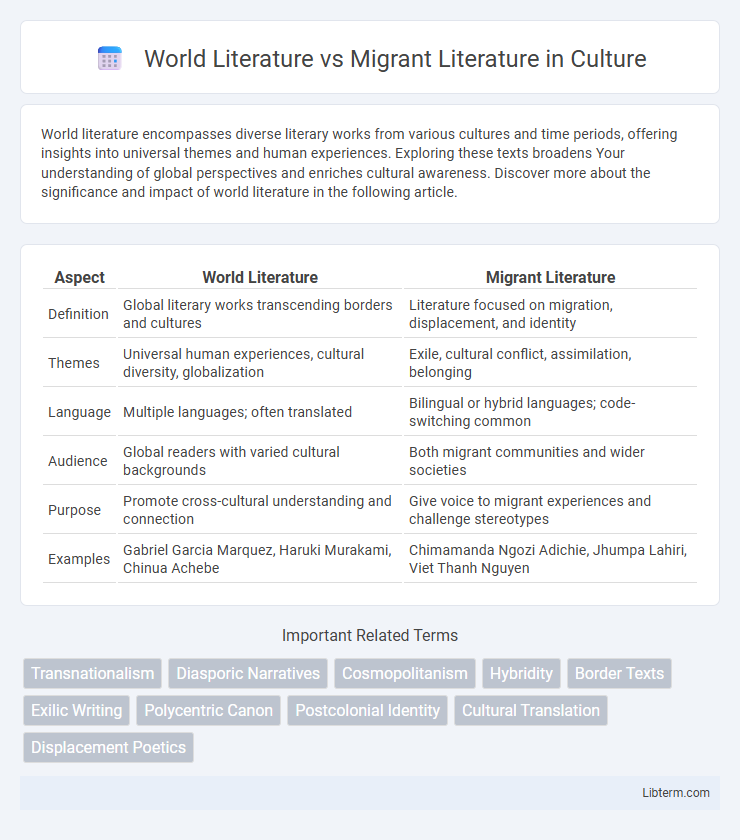World literature encompasses diverse literary works from various cultures and time periods, offering insights into universal themes and human experiences. Exploring these texts broadens Your understanding of global perspectives and enriches cultural awareness. Discover more about the significance and impact of world literature in the following article.
Table of Comparison
| Aspect | World Literature | Migrant Literature |
|---|---|---|
| Definition | Global literary works transcending borders and cultures | Literature focused on migration, displacement, and identity |
| Themes | Universal human experiences, cultural diversity, globalization | Exile, cultural conflict, assimilation, belonging |
| Language | Multiple languages; often translated | Bilingual or hybrid languages; code-switching common |
| Audience | Global readers with varied cultural backgrounds | Both migrant communities and wider societies |
| Purpose | Promote cross-cultural understanding and connection | Give voice to migrant experiences and challenge stereotypes |
| Examples | Gabriel Garcia Marquez, Haruki Murakami, Chinua Achebe | Chimamanda Ngozi Adichie, Jhumpa Lahiri, Viet Thanh Nguyen |
Defining World Literature and Migrant Literature
World Literature encompasses texts that circulate beyond their original cultural and linguistic boundaries, engaging global audiences through themes, narratives, and forms reflecting diverse human experiences. Migrant Literature specifically examines the stories of displacement, identity, and hybridity encountered by individuals and communities navigating migration, exile, or diaspora. The definition of World Literature highlights interconnected literary landscapes, while Migrant Literature centers on the socio-political realities shaping migrant identities and transnational belonging.
Historical Development of Both Genres
World Literature emerged as a global discourse in the late 19th and early 20th centuries, emphasizing cross-cultural exchange and the canonization of literary works beyond national borders, influenced heavily by imperialism and globalization. Migrant Literature developed prominently post-World War II, reflecting the experiences of displacement, identity crises, and cultural hybridity faced by immigrants, with narratives rooted in personal and collective histories of migration. Both genres evolved through historical contexts of mobility and diaspora, but World Literature prioritizes universality and canonical inclusion, whereas Migrant Literature centers on marginality and the negotiation of belonging.
Key Themes in World Literature
World Literature explores universal themes such as identity, conflict, and cultural interaction, emphasizing diverse narratives from multiple regions and epochs. It addresses issues like globalization, hybridity, and the human condition, reflecting interconnected societies and shared experiences. Migrant Literature, while part of World Literature, specifically centers on displacement, migration, exile, and the negotiation of identity within new cultural contexts.
Central Concerns of Migrant Literature
Migrant literature centers on themes of displacement, identity negotiation, and cultural hybridity, depicting the lived experiences of migration and the challenges of belonging. Unlike world literature, which emphasizes global literary exchange and canonical diversity, migrant literature foregrounds personal narratives and social issues such as assimilation, exile, and transnationalism. This genre highlights the complexities of memory, language barriers, and the quest for home, making it a critical lens for understanding contemporary globalization and diaspora.
Representation of Identity and Belonging
World Literature explores diverse identities through a global lens, emphasizing cross-cultural connections and universal human experiences, while Migrant Literature foregrounds the complexities of identity shaped by displacement, hybridity, and negotiation between home and host cultures. Migrant narratives often reveal the tension between preservation of original cultural identity and adaptation, highlighting feelings of alienation and the search for belonging in unfamiliar environments. Both genres engage with themes of identity and belonging but differ in scope, with World Literature addressing broad transnational experiences and Migrant Literature focusing on the intimate struggles of migration and diaspora communities.
Language, Translation, and Cultural Exchange
World Literature encompasses diverse linguistic traditions, promoting global cultural exchange through the translation of canonical texts into multiple languages. Migrant Literature, rooted in the lived experiences of displacement, often employs multilingualism and hybrid linguistic forms to reflect identity negotiation and cultural hybridity. The interplay between translation and original language in both genres facilitates cross-cultural dialogue and enriches the global literary landscape.
Notable Authors and Works
World Literature encompasses global masterpieces such as Gabriel Garcia Marquez's "One Hundred Years of Solitude" and Haruki Murakami's "Kafka on the Shore," highlighting universal themes through diverse cultural lenses. Migrant Literature features influential voices like Jhumpa Lahiri with "Interpreter of Maladies" and Chimamanda Ngozi Adichie's "Americanah," focusing on diasporic identities and migration experiences. Both fields showcase transformative narratives that explore cultural displacement, identity, and belonging across borders.
Globalization’s Impact on Literary Forms
Globalization has transformed both World Literature and Migrant Literature by fostering cross-cultural exchanges and hybrid narrative forms that reflect diverse identities and transnational experiences. World Literature often encompasses a wide range of texts translated and circulated globally, emphasizing universal themes and interconnectedness, while Migrant Literature delves deeply into the complexities of displacement, identity negotiation, and cultural hybridity caused by migration. The impact of globalization thus blurs traditional literary boundaries, encouraging innovative storytelling techniques and expanding the global readership for both genres.
Critical Reception and Academic Discourse
World Literature often receives critical acclaim for its global inclusivity and exploration of diverse cultural narratives, emphasizing universal themes that transcend national boundaries. Migrant Literature garners focused academic discourse for its nuanced portrayal of displacement, identity, and hybridity, highlighting the complexities of migration experiences and postcolonial realities. Scholars debate the criteria for categorization, with critical reception reflecting tensions between cosmopolitanism in World Literature and the specific socio-political contexts foregrounded in Migrant Literature.
Future Trends in World and Migrant Literature
Future trends in world literature will increasingly emphasize transnational narratives that transcend cultural boundaries, reflecting global interconnectedness and hybridity. Migrant literature will continue to gain prominence by highlighting themes of identity, displacement, and cultural negotiation, driven by ongoing migration patterns and diaspora experiences. Digital platforms and cross-cultural partnerships will further amplify diverse voices, fostering greater inclusivity and reshaping literary canons worldwide.
World Literature Infographic

 libterm.com
libterm.com